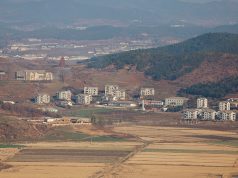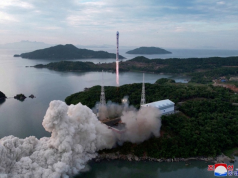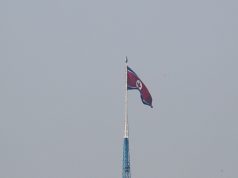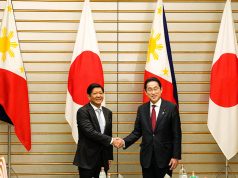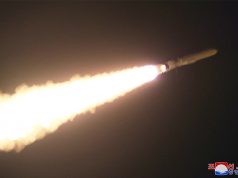
SEOUL – North Korea still does not appear to have mastered missile re-entry technology and will take at least one or two more years to do so, although its ability to miniaturize a nuclear warhead is advancing quickly, South Korea’s vice defense minister said.
Concern that North Korea is close to achieving its goal of putting the mainland United States within range of a nuclear weapon has underpinned a spike in tensions in recent months. U.S. President Donald Trump has said all options are on the table as he vowed not to allow that to happen.
“Both the United States and South Korea do not believe North Korea has yet completely gained re-entry technology in material engineering terms,” Vice Defence Minister Suh Choo-suk said in televised remarks on Sunday for a Korea Broadcasting System (KBS) show.
“We don’t feel they’ve reached that point yet but it’s true they are approaching it. We can’t pinpoint the exact timing, but it will take at least one to two more years.”
Suh said North Korea is likely to continue provocations, including nuclear tests, but did not see a big risk of the North engaging in actual military conflict.
Under the orders of leader Kim Jong Un, North Korea has been testing missiles at an unprecedented pace since last year and last week said it was developing a plan to land missiles near the U.S. Pacific territory of Guam.
North Korea said its last test of an intercontinental ballistic missile in late August was a “perfect and big success” with both re-entry and warhead control capabilities showing no fault. However, South Korean government and military officials have expressed their doubts about those claims and say more analysis is needed.
U.S. Chairman of the Joint Chiefs of Staff Joseph Dunford is visiting Seoul to discuss the rise in tensions between North Korea with South Korean President Moon Jae-in and Defence Minister Song Young-moo ahead of major joint U.S.-South Korean military drills scheduled for later this month.
South Korean Defence Ministry spokesman Lee Jin-woo said the joint drills, long a source of aggravation for Pyongyang, would go ahead as planned.
“They are just, legal and annual drills that are focused on defense and to curb North Korea’s provocations,” he told a regular briefing in Seoul.




